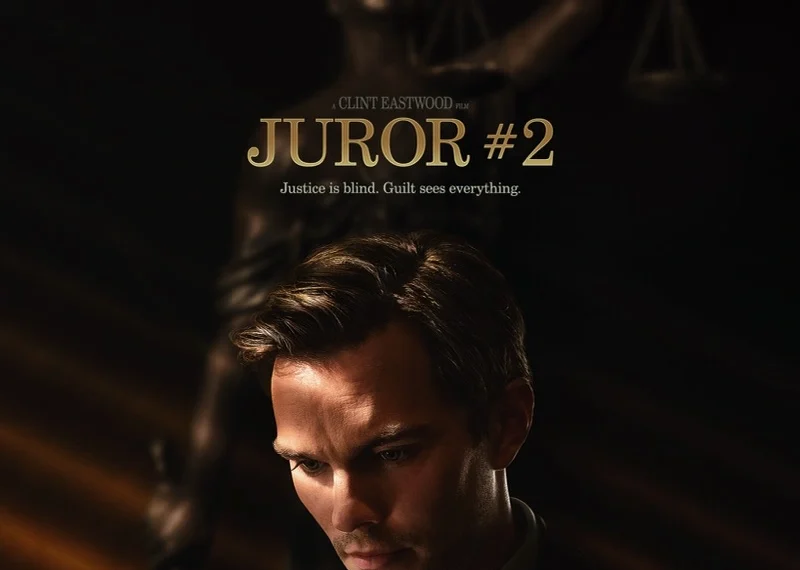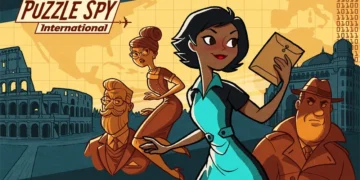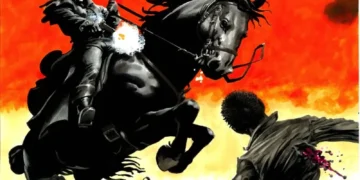Cast: Nicholas Hoult, Toni Collette, J.K. Simmons, Chris Messina, Gabriel Basso, Zoey Deutch, Cedric Yarbrough, Leslie Bibb and Kiefer Sutherland
Genre: Drama
Director: Clint Eastwood
In Irish Cinemas: 1st November 2024
Over the years, Clint Eastwood’s films have often struggled to live up to his legacy. For the past two decades, his directorial work has shifted from highly anticipated, mature dramas to a more inconsistent mix—sometimes compelling, often uneven, and occasionally disappointing. Especially in recent projects, the quality of his films seemed to suggest that his time as a director might be winding down. That’s why Juror #2 comes as such a refreshing surprise. Is it without flaws? No. But it’s undeniably captivating and delivers pure entertainment in a way that few recent Eastwood films have. Warner Bros. is seriously missing an opportunity by not putting more marketing muscle behind this one; Juror #2 truly has what it takes to captivate audiences.
Juror #2 is a masterful blend of legal and moral suspense—a true thriller that recalls a bygone era of adult-centered, intelligent entertainment. This compelling courtroom drama, rich with tension and ethical complexity, is increasingly rare in today’s film landscape. Clint Eastwood, known for his prowess in crafting narratives that delve into the human condition, has rarely ventured into courtroom settings. Yet, here, he channels his talents into a setting and story that feel both revitalising and potentially defining for his career. It’s a film that reinvigorates Eastwood’s artistry and stands as a fitting and profoundly satisfying culmination of his legacy in cinema.
Justin Kemp (played by Nicholas Hoult) is on the brink of a significant life change. He and his wife, Ally (Zoey Deutch), are expecting their first child, with Ally now in the late stages of her pregnancy—a time made even more emotional as they’re still recovering from a heartbreaking miscarriage. Just when they thought they could focus solely on their growing family, Justin is summoned for jury duty. Both of them are frustrated by the wrong timing, as the trial coincides with Ally’s final trimester, which should have been dedicated to preparing for the baby’s arrival. The case Justin is pulled into is a high-profile murder trial. Prosecuting attorney Faith Killebrew (Toni Collette), who is set on becoming the next District Attorney, is determined to secure a conviction. She aims to prove that James Sythe (Gabriel Basso) murdered his girlfriend, Kendall Carter (Francesca Eastwood), whose body was found battered and abandoned by the roadside. However, Sythe’s defence attorney (Chris Messina) argues that his client left the bar that night after a scuffle, claiming he went straight home afterwards, leaving reasonable doubt as to whether he was involved in her death. However, as the trial unfolds, Justin’s memory is triggered, and he realises something unsettling. On the night of Kendall’s death, he was at the very same bar at the same time. Driving home afterwards, he struck something on the road—a deer, he assumed. Now, Justin begins to question that assumption. The unsettling truth dawns on him: Sythe might be innocent, and the evidence could point, instead, to Justin’s involvement in the crime.
The jury is prepared to convict, but only one person stands in the way: Justin, a lone holdout facing an intense moral dilemma. While his hesitant questions irritate most jurors, they catch another member’s attention, a former cop (J.K. Simmons), who starts to sense that something might be amiss. Unlike the others, he suspects that this case might not be a straightforward murder committed by the victim’s boyfriend but rather a tragic hit-and-run that’s being misinterpreted. As the jury’s deliberation intensifies, Justin grapples with the weight of his conscience, torn between his doubts and the pressure to conform. Meanwhile, Faith, the prosecutor, begins to sense that the case she thought was a guaranteed conviction might not be as airtight as it seems. With her political future riding on a sentence to boost her campaign, she questions whether more lurks beneath this supposed “open-and-shut” case.

Nicholas Hoult leads a talented cast, delivering a nuanced performance that anchors the film, while the standout supporting roles by Zoey Deutch and J.K. Simmons bring added depth and charm. Hoult brings a restrained intensity to his character, skillfully conveying a moral struggle that resonates without overwhelming the narrative. Deutch, cast as the supportive wife, transcends the traditional limitations of the role, creating a character that’s both memorable and unexpectedly compelling. Simmons, too, breathes life into a character that could have quickly been sidelined as a plot device; his performance is so engaging that it feels essential. Despite a subplot that receives only limited screen time, Toni Collette makes a powerful impression, especially as her storyline picks up toward the film’s conclusion.
Meanwhile, Chris Messina shines in his scenes, particularly in the courtroom sequences and his interactions with Collette, though he could have been given more to do overall. Gabriel Basso and Francesca Eastwood add to the ensemble’s strength, alongside notable supporting roles from Leslie Bibb, Kiefer Sutherland, Cedric Yarbrough, and others. Together, the cast brings out the best in the material, making each character distinct and contributing to the film’s richness.

Director Clint Eastwood appears revitalised in this film, collaborating with screenwriter Jonathan A. Abrams. While some scenes may come off as the first take, and the third act exhibits notable flaws, much of the movie delivers an enjoyable experience for adult audiences. Abrams incorporates several additional twists that may be excessive, resulting in a conclusion that feels hurried. However, the film effectively captures a pervasive scepticism toward the legal system, a theme that resonates deeply with Eastwood’s vision. This blend of tension and intrigue contributes to the film’s overall appeal, providing viewers with a thought-provoking and entertaining cinematic experience.
Juror #2 would have been recognised as a contender for major awards in a previous era. This doesn’t imply that the film would have received a nomination automatically, but it would undoubtedly have been actively campaigned for and strategically positioned within the awards circuit. Although the Academy’s perspective on films of this nature has evolved significantly over the years, it still retains echoes of that past approach. The film deserves similar recognition and consideration today, even if it might not have reached the final nominations or wins that often accompany such campaigns. Its merit and artistic value justify the attention it seeks, reflecting the ongoing conversation about the role of cinema in contemporary award considerations.

Juror #2 exceeds all expectations delightfully. While it may not be flawless, it offers a unique brand of cinema that has become increasingly rare, making it a genuine joy to experience. Warner Bros. should take pride in showcasing this film rather than attempting to downplay its existence. This film is a delightful surprise, and if it happens to be the final work of a notable director, it deserves a more celebratory acknowledgement. Simply put, it warrants better recognition and appreciation, especially given its quality and impact on the cinematic landscape.
Overall: 7/10


















